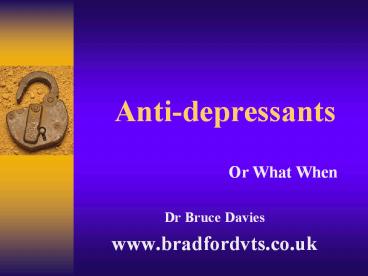Anti-depressants PowerPoint PPT Presentation
Title: Anti-depressants
1
Anti-depressants
- Or What When
- Dr Bruce Davies
- www.bradfordvts.co.uk
2
Range
- Tricyclics
- Tetracyclics
- SSRI
- SNRI
- MAOI
- Oddities
- Adjuvants
3
Factors Influencing Choice
- Features of illness, e.g. agitation, hypersomia
- Suicide risk
- Other therapy
- Other illness.
- Side effects
- Cost
- Special problems e.g. Age, driving, pregnancy
4
Drug Failure
- Non compliance.
- Inadequate dosage.
- Other drugs e.g. alcohol, caffeine.
- Unresolved outside problems.
- Up to 25 failure even if above dont apply.
5
Tricyclics
- Amitryptyline
- Potent sedative
- Weight gain
- Anticholinergic
- Most researched
- 150mg / day
- (Therapeutic in 95 of adults)
- Clomipramine
- Similar side effects to amitryptyline.
- Said to be best for obsessional symptoms.
- 150mg / day
6
Tricyclics
- Dothiepin
- Sedative
- Same side effects as amitryptyline.
- By far and away the most toxic antidepressant.
- 150 mg / day
- Imipramine
- Stimulant
- Anticholinergic
- 150 mg/ day
7
Tricyclics
- Lofepramine
- Least toxic TCA.
- Minimal sedative side effects.
- Anticholinergic
- Doubts about efficacy.
- 210 mg / day
- Protriptyline
- Stimulant.
- Anticholinergic
- 40mg / day
8
Tetracyclics
- Mianserin
- Good safety in overdose.
- Few sedative or anticholinergic properties.
- ? Agranulocytosis risk
- 90 mg / day
- Maprotiline
- Similar side effect profile to amitryptyline.
- Seizures severe in overdose.
- 150 mg /day
9
SSRI
- First choice in elderly.
- First choice if heart disease.
- First choice if suicide risk.
- More expensive.
- Side effects
- Like TCA reduce with time.
- Gut problems predominate.
- Flat dose response curve so no need to titrate
dose upwards.
?
10
SSRI
Citalopram Few interactions Most expensive 20 mg /day
Fluoxetine Sedation Skin s/e Anxiety Cheapest 20-80 mg /day
Fluvoxamine Gut s/e Insomnia - 200 mg /day
Paroxetine Sedation Withdrawal problems ? 20 mg /day
Sertraline Diarrhoea 50 mg /day
11
SSNRI
- Venlafaxine
- Selective Serotonin and noradrenaline reuptake
inhibitor like amitryptyline. - Few other effects unlike amitryptyline.
- 75-150mg / day minimum
- Dry mouth, somnolence, high BP, nausea, headache
and dizziness.
12
MAOI
- The old ones block peripheral MAOI ( B ) and
central MAOI (A) so a low tyramine diet is
needed. ? Obsolete. - Moclobemide.
- Only MAOI-A.
- ? Role.
- ? Special place in anxiety disorder.
- 300-600mg / day.
13
Oddities
- Trazodone.
- Unique structure.
- Low cardiotoxicity, few anticholinergic side
effects. - Drowsiness .
- Nausea.
- 150 mg /day.
14
Oddities
- Tryptophan
- Natural amino acid - Serotonin precursor.
- Eosinophilia-myalgia syndrome, Hospital
initiation only. - Adjuvant to others ?
- Flupenthixol
- Some doubts as to efficacy.
- Fast action
- 1 mg / day
15
Adjuvants and Combinations
- Realm of specialists
- Lithium, carbamazepine
- Mixtures i.e. SSRI and TCA
- Dangerous need expert supervision
16
Anxiety
- Usually worth trying a antidepressant.
- May be useful to avoid the stimulant ones !
- May need higher doses.
- Initiation may lead to paradoxical increase in
symptoms. ? Cover with short course of anxiolytic.
17
Anxiety
- ? Role of benzodiazepines.
- ? Beta-blockers.
- Buspirone.
- Some efficacy, but small.
- Slow onset, 2-4 weeks.
18
DSM - IV
Duration gt 2 weeks
Depressed mood or Marked loss of interest or
pleasure in normal activities
Plus 4 of
- Significant change in weight
- Significant change in sleep pattern
- Agitation or retardation
- Fatigue or loss of energy
- Guilt / worthlessness
- Cant concentrate or make decisions
- Thoughts of death or suicide
19
Incidence Of Depression 2000 Patients
100 - major
100 - minor
200 - subclinical
Depression. In 50 of patients it may not be
acknowledged.
20
ICD - 10
- Patient has low mood
- How bad is it and how long has it been going on?
- Have you lost interest in things?
- Are you more tired than usual?
21
ICD - 10
- Mild
- Two criteria from 1-3 and 2 others.
- Moderate
- Two criteria from 1-3 and 3-4 others or a yes to
question 5. - Severe
- Most of the criteria in severe form especially
questions 5 9.
22
BUT BUT BUT
- But there is a lot more than the drugs.
- The use of other therapies is equally important.
- The doctor may be the best drug.
- Availability is often the limit to other
treatment methods.
23
Based On
- BNF June 2000.
- Depression in General Practice. Tylee, Priest
Roberts. Pub. Martin Dunitz. 1996. - GP Psychotropic Handbook. S Bazire. Quay Books.
1995. - Basic Notes in Psychiatry. Michael Levi. Kluwer
Books. 1997.

